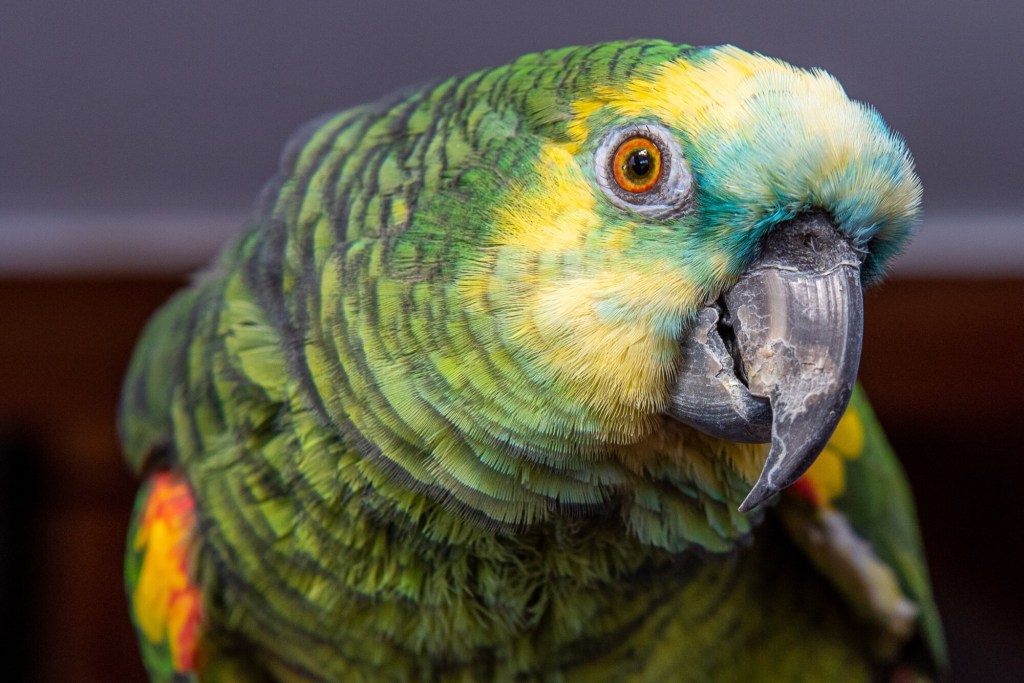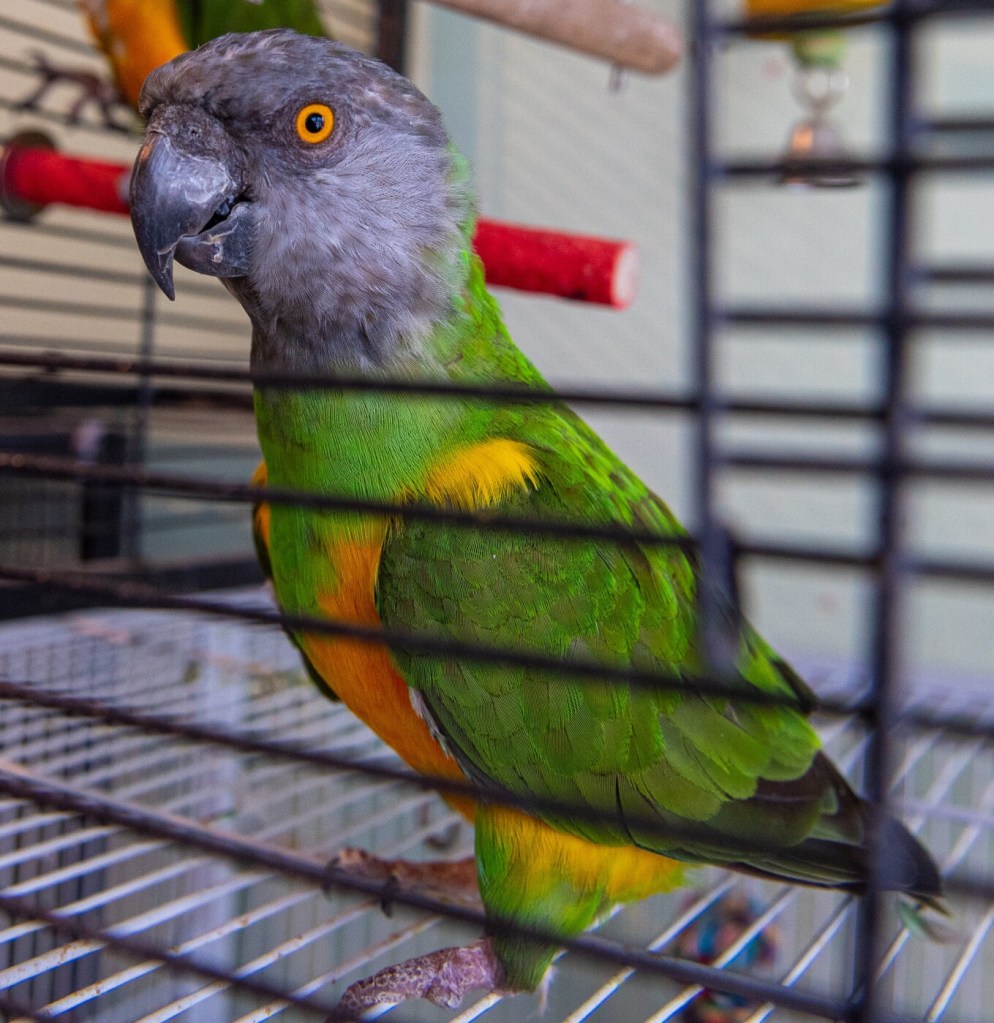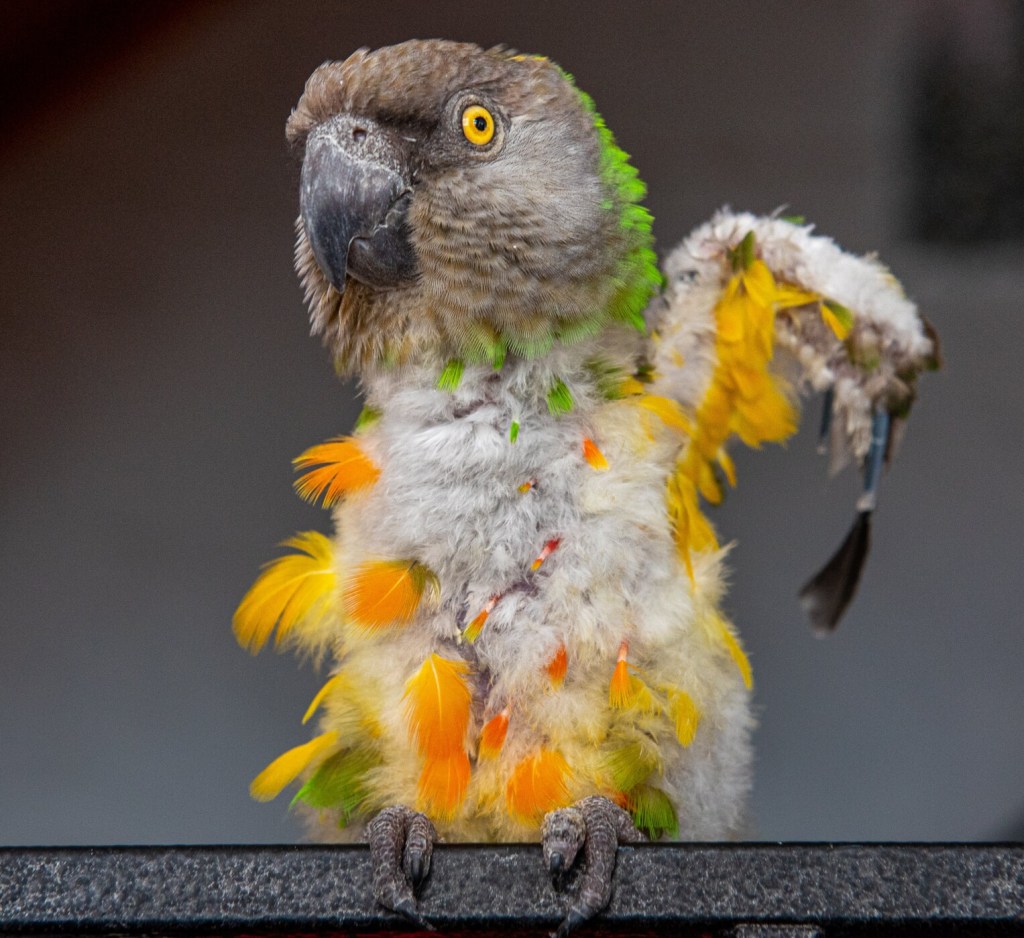HEBRON — Christine Keough’s Furry Glen Farm is a loving family home open to feathery friends awaiting the right owner.
The farm is known to the Hebron community and many bird enthusiasts in Maine as an unofficial rescue shelter for birds.
Keough’s journey to bird ownership, rehabilitation and rehoming began three years ago, not long after Keough moved to town with her family and made the jump from home schooling to public school for her two children.
“I just sat in my house and I cried because my kids were gone, the house was silent and I was just listening to the clock tick,” she said. “So, I went outside and I got a cricket, put him in a glass jar, put him on the kitchen table and made him have lunch with me.”
Keough said the house was so quiet and she was feeling so alone she declared, “I will never be this alone again.”
“My motto for Furry Glen is, ‘Never spend a single day alone,'” she said. “I’ll tell you, now, it is never quiet and it is never boring.”
Keough’s first birds were a couple of small parakeets, but things changed quickly when she realized she loved having birds and there was room for more.
She contacted Siesta Sanctuary in Harmony, and the owners said they had a couple of African grey parrots and some Senegal parrots. Keough said she did not know what Senegals were, but she would take them.

Parakeets bask in the afternoon sun last Tuesday at Furry Glen Farm, a rehabilitation and rehoming center in Hebron. Russ Dillingham/Sun Journal
Once word got around that Keough kept birds, people suddenly had an aunt or a friend or neighbor who was desperate to get rid of one, she said.
Keough eventually had to get choosy about the birds she could keep, but she remained committed to taking in surrenders temporarily to rehome because she does not like the idea of people hanging onto an animal they do not want.
The average rehoming period for a bird is about every two years, Keough said.
Depending on the type of parakeet, they can live from five to 30 years. Senegals can live more than 30 years, cockatoos up to 40 years and different types of macaws up to 80 or 90 years.
“It is better to rehome a bird if you think you’re not giving it its best life,” Keough said. “There are so many people who could give any animal a really great home. It breaks my heart to hear about birds living in small cages for so long.”

Angel, a sulfur-crested cockatoo, greets Christine Keough last Tuesday afternoon at Furry Glen Farm, Keough’s rehabilitation and rehoming center in Hebron. Russ Dillingham/Sun Journal
Angel the sulfur-crested cockatoo is among Furry Glen’s quirkiest residents after having been introduced Dec. 23 to the Keough household.
One day, Keough was stopped at a gas station when her truck experienced a mechanical problem. Keough put Angel’s cage on the front seat and went back into the Dunkin’ for help.
When jumper cables would not help and Keough’s AAA membership number would not go through, she realized she would be waiting even longer, so she asked if she could bring Angel inside while Keough continued to address her truck issue.
“I come back into the Dunkin’ Donuts and everybody had been flocking around Angel and giving him pieces of doughnut,” Keough said. “And all I can hear is: ‘Eff you! Eff you! Eff you!’ Except it was the actual word. I had to apologize, and they all thought it was so funny. It was the most embarrassing thing.”
Keough said most of those at Dunkin’ happily accepted Angel’s salty language.
Angel and some of Keough’s other birds also responded in big ways at the holidays when Keough put a Christmas tree in their room. As the Senegals screamed at the tree and African greys Oliver and Taxi hid, Angel repeated his favorite colorful phrase until Keough removed the tree.
Keough said the birds were fine with the family’s Christmas tree in the living room, but clearly did not want a tree of their own.
Oliver and Taxi also delight in drama, especially Oliver, which often drags Keough’s husband, Merle, into interesting situations. Oliver was silent over the past few weeks because he apparently felt threatened by now Florida-bound Jimmy the macaw. Otherwise, Oliver talks in complete sentences and says “Christine” in Merle’s voice and “Merle” in Christine’s voice.
Keough said she has gotten so used to Oliver calling her that when Merle yells for her, she thinks it is the bird.
Oliver and Taxi came from a breeder in New Hampshire and were untamed. Keough could not touch them or get too close to them. Oliver also “swore like a sailor.” Anytime someone would drop something or mess up in an obvious way, Oliver would be there to deliver an, “Oh, (expletive)!”

Echo, a pineapple conure, is Christine Keough’s most colorful bird at Furry Glen Farm in Hebron. Russ Dillingham/Sun Journal
Oliver is now sit trained — meaning he behaves near people when they do not handle him — and Taxi is hand trained. African greys enjoy the company of people and other birds, but typically do not like to be handled, Keough said. Other than a bop to the head delivered with an “I love you” from Oliver, Keough can handle both, and Taxi is the dancer.
“Taxi and I do a goodnight dance. I made up a little song with her name and she’ll just be bopping to it,” Keough said. “Oliver has his own song. It’s from ‘Sesame Street,’ but ‘Oliver, Oliver’ is the only part he knows. He knows if he starts singing it, then I will start, and then he gets the whole song.”
Keough has also become matchmaker as a bird keeper. Rikki and Yoshi the Senegals came from the same house and were kept in separate cages. From the moment they came to Furry Glen Farm and were able to interact, they became a bonded pair and have adored making babies ever since.
Keough said Rikki can also be a bit of a pain, having drawn more blood than any other bird.
Almost all of the birds scream “Rikki!” because he has bitten Keough often, after which she has typically yelled his name. Rikki is now caged most of the time — in a roomy setup — because he has taken to drawing blood purposefully, knowing it gets him attention.
“I have a scar on my wrist from about a year and a half ago where he got between two veins,” Keough said. “He got me so deep that he almost yanked one, a major one, right out of my arm and he almost killed me. It was the price of the drama.”
Although swear words are not so much the norm these days from the birds, Keough said the quirkiness has hardly left the building. Chuckles the Senegal, which Keough said is probably her favorite, is 22 years old and came from a veterinarian who rescued her for a man who was in and out of the hospital and concerned he could not keep a good home for Chuckles. Keough said she sends the man a Christmas email every year to let him know how Chuckles is doing.
Chuckles is one of the birds, Keough said, that came in and stayed because it is such a good fit for the family.
At the same time, Keough said she often finds herself losing arguments with Chuckles.
“She’ll say, ‘Christine, come here,'” Keough said. “I’ll tell her, ‘No, I’m busy.’
“Then she shouts: ‘Christine, come here! I want to go to bed!’
“I say, ‘No, you can wait.'”
Chuckles, however, can be unrelenting, saying: “Christine! I want to go to BED!”
“Then, I’ll carry her over to her cage and I realize, wow, I just lost an argument with my bird,” Keough said. “She won.”
Send questions/comments to the editors.











Comments are no longer available on this story